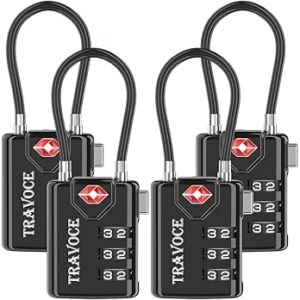Plug For Greece: What You Need To Know

What is the plug for Greece? Before you travel, check the information below to make sure your electronic devices are compatible with the outlet type and voltage.
Electrical Summary
Plug Compatibility: Type C, Type F
Voltage: 220V – 240V
Frequency: 50 Hz
Type C

Type F

Can North Americans use Electronics in Greece without an Adapter?
No! North Americans will need an adapter for the outlets and a transformer for the voltage when traveling to Greece. North Americans device plugs will not work with the outlet types in Greece. Also, the voltage in Greece is different from North American voltages.
Can Europeans use Electronics in Greece without an adapter?
Yes! Europeans do not need a travel adapter or transformer when traveling to Greece. Most device plugs will work with the outlet types in Greece. Also, the voltage in Greece is the same as in Europe.
What Outlet does Greece Use?
Type C

Type C plug sockets are used in Europe, Africa and Asia. They have two round pins and no grounding pin. These plugs are typically used with devices that have a voltage of 220-240V. This outlet is rated for 2.5 amps. Plug Type E, and Type F are compatible with this socket. All other plug types will need an adapter.
Type F

Type F electrical plug sockets are used in Germany, Spain, Italy and some parts of Africa. They have two round pins and a grounding pin. These outlets are typically used with devices that have a voltage of 220-240V. This outlet is rated for 16 amps. Plug Type C and Type E are compatible with this socket. All other plug types will need an adapter.
Recommended Products:
Should I use a VPN when traveling?
YES! Using a VPN when traveling is highly recommended to protect your online privacy and security. Public Wi-Fi networks in hotels, airports, and cafés are often unsecured, making you vulnerable to hackers and data theft. A VPN encrypts your internet connection, safeguarding sensitive information like passwords and banking details. It also allows you to bypass geo-restrictions, granting access to streaming services and websites that may be blocked in certain countries. Additionally, a VPN helps prevent government surveillance and ISP tracking. For a seamless and secure browsing experience while traveling, choose a reliable VPN with fast speeds and strong encryption.
Greece Travel Essentials:
Is it safe to drink water in Greece?
The safety of drinking water in Greece is generally good. According to the World Health Organization (WHO), nearly 100% of the population in Greece has access to improved drinking water sources, which means that the water is from a protected well or spring, or treated through a piped system.
The water treatment system in Greece is modern and meets European Union standards, and the tap water is safe to drink in most urban areas. However, in some rural areas, the water quality may not be as good due to poor sanitation and lack of treatment facilities.
Even if the tap water is considered safe to drink in Greece, it is still advisable to take precautions to avoid potential contamination. For example, it is recommended to boil tap water before drinking it or to use a water filter.
If you are traveling to Greece, it is recommended to consult with a healthcare provider or a travel health specialist for specific recommendations on how to stay healthy and avoid waterborne diseases.
We recommend always packing a filtered water bottle when traveling!
Travel Essentials
Be sure to check our list of travel essentials before your trip!
Should I get travel insurance when traveling to Greece?
It is generally recommended to get travel insurance when traveling to a different country. Travel insurance can provide financial protection and peace of mind in case of unexpected events, such as medical emergencies, trip cancellations, lost or stolen baggage, or other travel-related mishaps.
Travel insurance can cover various expenses related to your trip, such as medical expenses, emergency medical transportation, trip cancellation or interruption, lost or stolen baggage or personal belongings, and other travel-related expenses.
Before purchasing travel insurance, it’s important to carefully review the policy details, including the coverage limits, exclusions, and any applicable deductibles or copays. You should also make sure that the policy covers any activities or destinations that you plan to participate in or visit during your trip. Click here to price for Travel Insurance for Greece
Frequent Questions
What is Greece known for?
Greece is known for its ancient history, stunning islands, and Mediterranean cuisine. It is the birthplace of democracy, Western philosophy, and the Olympic Games. Visitors flock to Greece for iconic landmarks like the Acropolis in Athens, the white-washed buildings of Santorini, and the beautiful beaches of Crete and Mykonos. Greek culture, mythology, and hospitality make it one of the most popular tourist destinations in the world.
Where is Greece located?
Greece is located in Southeastern Europe, on the southern tip of the Balkan Peninsula. It shares land borders with Albania, North Macedonia, Bulgaria, and Turkey. Surrounded by the Aegean, Ionian, and Mediterranean Seas, Greece is made up of a mainland and over 6,000 islands and islets, around 200 of which are inhabited.
What is the capital of Greece?
The capital of Greece is Athens, a city with a history that spans over 3,000 years. Known as the cradle of Western civilization, Athens is home to world-renowned archaeological sites such as the Parthenon, the Acropolis Museum, and the Ancient Agora. It is also the largest city in Greece and serves as its cultural, political, and economic hub.
What language is spoken in Greece?
The official language of Greece is Greek. Modern Greek is spoken throughout the country, and it has its own unique alphabet and linguistic roots that trace back to ancient Greek civilization. English is widely spoken in tourist areas, making communication easy for international visitors. Be sure to grab a Greek phrasebook for your trip.
What currency is used in Greece?
Greece uses the Euro (EUR, €) as its official currency. As a member of the European Union and the Eurozone, Greece adopted the Euro in 2001, replacing the former Greek drachma. Credit and debit cards are commonly accepted in cities and tourist destinations, though cash is still preferred in some rural areas. Get great rates on currency transfers with Wise
Is Greece a safe country to visit?
Yes, Greece is generally considered a very safe country for tourists. Crime rates are low, and most visits are trouble-free. Like any travel destination, it’s important to stay aware of your surroundings and take normal safety precautions, especially in crowded areas or tourist hotspots.
What is the weather like in Greece?
Greece has a Mediterranean climate with hot, dry summers and mild, wet winters. The summer months, from June to September, are ideal for beach holidays and island hopping, with temperatures often reaching 30°C (86°F) or higher. Spring and autumn are perfect for sightseeing, with pleasant weather and fewer crowds.
What are the best places to visit in Greece?
Some of the best places to visit in Greece include Athens for its historical landmarks, Santorini for its sunsets and volcanic beaches, Mykonos for nightlife, and Crete for a mix of culture, cuisine, and natural beauty. Other must-see destinations include Rhodes, Delphi, Meteora, and the Ionian Islands like Corfu and Zakynthos. Pick up a Greece guidebook for additional recommendations.
What is traditional Greek food?
Traditional Greek food is known for its fresh ingredients, olive oil, herbs, and Mediterranean flavors. Popular dishes include moussaka (a baked eggplant and meat casserole), souvlaki (grilled meat skewers), tzatziki (yogurt and cucumber dip), Greek salad, and baklava (a sweet pastry with nuts and honey). Greek cuisine is both healthy and flavorful, drawing on centuries of culinary tradition.
How expensive is Greece to visit?
Greece is a relatively affordable European destination. While luxury resorts and high-end islands like Santorini and Mykonos can be expensive, there are plenty of budget-friendly options on the mainland and other islands. Accommodation, food, and transportation can be quite reasonable, especially in less touristy areas or during the shoulder seasons.
Travel Summary
Greece is also home to over 6,000 islands, each with their own unique charm and character. The Cyclades islands, including Mykonos and Santorini, are famous for their white-washed buildings and picturesque sunsets. The Ionian islands, such as Corfu and Zakynthos, offer stunning beaches and lush greenery. Visitors can explore ancient ruins, go sailing or hiking, and enjoy delicious seafood and local wine.
Greece is also a culinary destination, with a range of traditional dishes such as moussaka, dolmades, and tzatziki, as well as a thriving modern food scene. The country’s wine industry is also growing, with a range of indigenous grape varieties and wine regions to explore.
Greece is a welcoming destination for travelers, with a strong sense of hospitality and a rich cultural heritage. The official language is Greek, but many people speak English as well. The country has a well-developed tourism infrastructure, with a range of accommodations and activities to suit all budgets and interests.
Overall, Greece is a must-visit destination for anyone looking for a mix of history, culture, and stunning natural beauty. Whether you’re exploring ancient ruins, soaking up the sun on a beautiful beach, or enjoying delicious food and wine, Greece has something for everyone.
Check out our Countries page for more info on countries like the Austria, Germany, United Kingdom, France, Spain, and Portugal.





